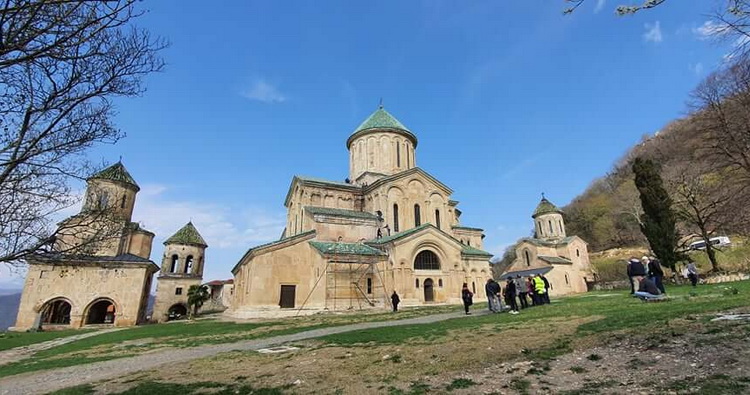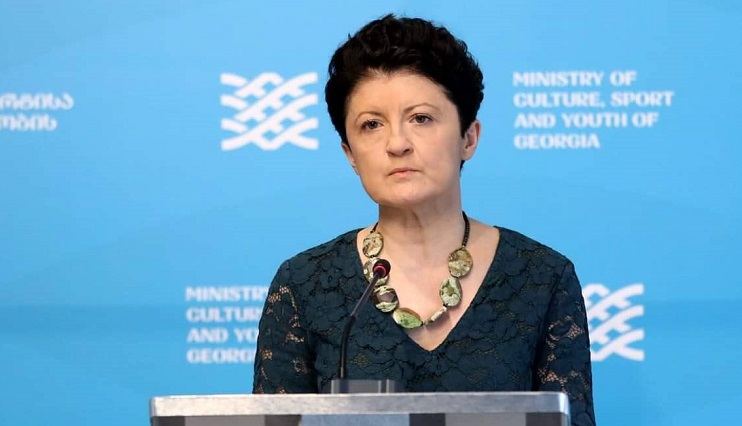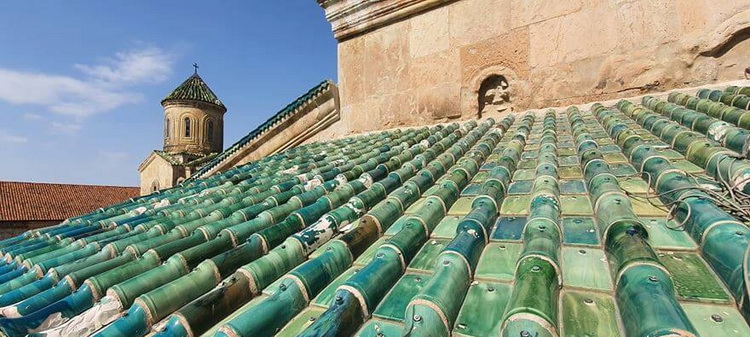Culture Ministry: research centre report on Gelati UNESCO site conservation problems “politically motivated”

The Culture Ministry said it was communicating with UNESCO on steps being taken to address the problem at Gelati since the appointment of Minister Thea Tsulukiani in the spring of 2021. Photo via National Agency for Cultural Heritage Preservation of Georgia
The Georgian Ministry of Culture on Tuesday responded to a report by the National Research Centre for Georgian Art History and Heritage Preservation that had pointed to the process of conservation at western Georgia’s Gelati complex, a UNESCO World Heritage Site, being “centralised” and “non-transparent” and the works being carried out through “extreme methodological violations”, by calling it “politically motivated”.
The state body was responding to the 38-page document, produced last week, that said frescoes in the western part of the monastery - where the leakage was reported in the summer of 2020 and followed by a series of ongoing controversy around efforts made to address the subsequent damage - had their “authentic visuals tarnished” in “violation of international standards” during recent conservation efforts.
It also called into question the agreement for the conservation works between Georgia’s National Agency for Cultural Heritage Preservation and the Giovanni Secco Suardo Association, an Italian group of restoration professionals, by calling the latter’s methodology for the efforts “false” and its intervention in the works “concerning”.
In its response, the Ministry said the report had been drawn up without either its feedback or involvement of “domestic or foreign experts” invited by the body for addressing the damage caused by leaks into the 12th century monastery.
It also said the document had been produced without the knowledge of the Manager and Scientific Committee Chair of the Centre, called it “surface-level” and its authors “incompetent”, and alleged the resulting report had been released with “narrow party interests”.
 The Ministry said the authors of the report have had negative attitude towards Minister Thea Tsulukiani. Photo: Culture Ministry press office.
The Ministry said the authors of the report have had negative attitude towards Minister Thea Tsulukiani. Photo: Culture Ministry press office.
The culture body also said it was communicating with UNESCO on steps being taken to address the problem at Gelati since the appointment of Minister Thea Tsulukiani in the spring of 2021.
The response follows the progressive emergence of the damage to the frescoes at Gelati over the recent years, as well as the resulting controversy between state cultural bodies on the one hand, and a part of culture field professionals criticising the formers’ response to the crisis around the World Heritage Site on the other.
The reports on rainwater leaks into the St Mary Temple - a central part of the monastery - in 2020 sparked frantic work on safeguarding the site, as well as criticism from independent experts.
The National Agency for Cultural Heritage Preservation later fined and replaced the contractor company working on the roofing of the site, while a lack of local professionals for monument rehabilitation was later cited both by the Agency and the Ministry as a cause of the problems with the botched rehabilitation works around Gelati.
In August 2021, a year after the reports of rainwater leakage into the cultural heritage monument, the UNESCO World Heritage Committee lamented the "fragile state of conservation" of the site and called on the Georgian Government to implement a solution for safeguarding the monastery from precipitation via a "workable solution".
 The roof tiling selected in the rehabilitation work that later proved defective and leaked rainwater in 2020. Photo via National Agency for Cultural Heritage Preservation of Georgia.
The roof tiling selected in the rehabilitation work that later proved defective and leaked rainwater in 2020. Photo via National Agency for Cultural Heritage Preservation of Georgia.
The statement followed comments by UNESCO experts invited to study the damage in June of the same year, with the professionals saying the frescoes were "in very bad condition". They told the Georgian press the infiltrating water had caused shifts in salt substances inside the walls, leading to damage to the paint of the frescoes.
They added the damage to the frescoes was still ongoing, but added it was possible to halt the process "with a correct approach".
Tsulukiani said in May 2021 some of the damage caused to the wall paintings would be “irreversible” and called the 2008-2020 rehabilitation work on the complex a "big mistake" and an "experiment" that has proved "damaging" to the major monument of cultural heritage. A part of the domestic culture sector professionals, however, has criticised the Minister for her handling of the works for addressing the problems at the monument.
In November 2022, the Ministry invited professionals from the International Centre for the Study of the Preservation and Restoration of Cultural Property to evaluate the rehabilitation work at the site launched the previous year. Following the visit, Tsulukiani said the assessments by the Centre were “positive”.
 Tweet
Tweet  Share
Share